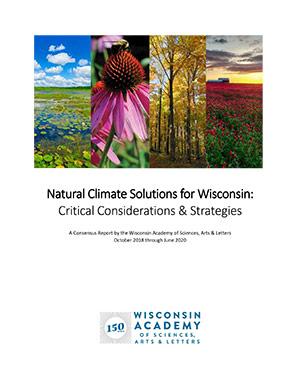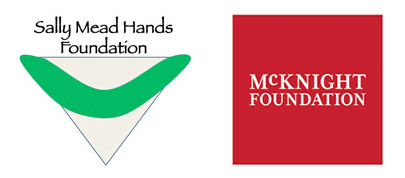These reports from the Climate & Energy Initiatives team are available for download and public use. If you have questions about these reports or would like to incorporate elements from them in your work, please contact the Climate & Energy Initiatives team.

Opportunities for Carbon Sequestration and Storage
Wisconsin’s forested lands are ripe with potential for increasing carbon sequestration and storage. Over the winter and spring of 2021-22, the Wisconsin Academy of Sciences, Arts & Letters worked with a team of forestry experts from across the state and conducted focus groups and interviews with 57 people who work in the forestry industry. From this research effort, the Climate & Energy Team wrote the corresponding report that contains recommendations that, if implemented, will increase carbon sequestration and storage in forestry.

Identifying Priorities and Potential
Carbon Storage in Wisconsin's Landscapes: Identifying Priorities and Potential (2021) reflects our efforts with numerous stakeholders to reveal broad general agreement on what characterizes high-quality land carbon sinks; the value of incorporating co-benefits (such as biodiversity, water quality, and flood prevention) in prioritizing sites for protection; and the importance of centering equity in decision-making. The work detailed in this forthcoming report synthesizes the effort of numerous individuals representing a wide range of organizations, which include state agencies, tribal organizations, nonprofits, and academia. A collective synthesis has allowed for a diverse and more comprehensive consideration of natural climate solutions that work for Wisconsin.

Critical Considerations & Strategies
Natural climate solutions (NCS) are a broad suite of land conservation, restoration, and management practices that store carbon and/or avoid greenhouse gas emissions from landscapes and wetlands. Between October 2018 and May 2020, the Wisconsin Academy convened a powerful network of leaders representing academia, public agencies, nonprofits, tribal nations, farms, and forestry, to examine a wide variety of cross-cutting strategies for advancing NCS in Wisconsin. While hundreds of specific ideas were raised over the course of ten meetings, several common threads and critical considerations emerged. Natural Climate Solutions for Wisconsin: Critical Considerations & Strategies (2020) captures these critical considerations and promising strategies for advancing NCS and equitably addressing climate change in Wisconsin.

On November 8, 2019, the Wisconsin Academy and partners brought together the state's best strategic thinkers on climate change for Climate Fast Forward, a different kind of conference that leveraged collaboration and crowdsourcing in the pursuit of ready-to-go solutions for carbon reduction and climate resilience. Over 300 leaders from a variety of sectors — government, tribal nations, advocacy, the sciences, business, utilities, and arts and culture, as well as citizens from all walks of life—came together to develop key recommendations for how Wisconsin can become a clean energy leader with a practical plan to deal with climate change. This January 2020 report, collated by the Academy team, provides a recap of Climate Fast Forward, primary findings, and overarching themes as well as a comprehensive appendix, including notes transcribed from all flipchart notes from small groups in the five breakout tracks.



